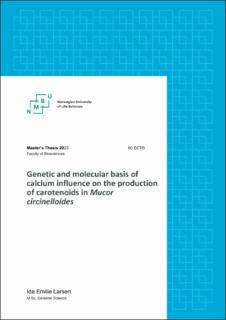| dc.contributor.advisor | Simen Rød Sandve | |
| dc.contributor.advisor | Volha Shapaval | |
| dc.contributor.author | Larsen, Ida Emilie | |
| dc.date.accessioned | 2023-07-06T16:29:46Z | |
| dc.date.available | 2023-07-06T16:29:46Z | |
| dc.date.issued | 2023 | |
| dc.identifier | no.nmbu:wiseflow:6839622:54592721 | |
| dc.identifier.uri | https://hdl.handle.net/11250/3076850 | |
| dc.description.abstract | Karotenoider er høyt verdsatte metabolitter, på grunn av deres mangfoldige, kommersielle bruksområder i mat, fôr og kosmetisk industri. Spesielt karotenoider produsert av sopp er av bioteknologisk interesse på grunn av deres ernæringsmessig egenskaper. I soppceller nøytraliserer karotenoider frie radikaler, og forhindrer dermed oksidativ skade i soppen. Mucor circinelloides er en dimorfisk, filamentøs muggsopp, som produserer mange karotenoider som kan brukes i diverse bioteknologiske områder. Tidligere har det blitt påvist at mangel på kalsium fører til økt produksjon av karotenoider i denne arten. Kalsium er aktiv i mange vitale prosesser i sopp, slik som dannelsen av cellevegger, hyfe vekst og stresstoleranse i celler. Kalsium er en ekte sekundær budbringer, som påvirker alle aspektene av en celles livssyklus, inkludert stressresponser og akklimatisering. Man vet foreløpig ikke nøyaktig hvordan kalsiummangel påvirker pigmentproduksjon i Mucor circinelloides. For å fylle dette kunnskapshullet trenger man mer kunnskap om den genregulatoriske og molekylære responsen som fører til økt pigmentering i Mucor circinelloides. Som en del av det pågående Earth Biogenome prosjektet, ble genomet til Mucor circinelloides sekvensert og satt sammen. Mucor circinelloides ble kultivert med og uten tilgang til kalsium i vekstmediet. Spektroskopi og kromatografi ble gjort for å kvantifisere karotenoid og fettinnhold ved de ulike behandlingene. Videre ble genuttrykket kvantifisert og analysert for å forstå kalsiums påvirkning på genregulering av produksjon av karotenoider. Vi fant at kalsium påvirker den karotenoidproduserende veien via økt protein syntese, dimorfisk endring, karakterisert av økt gjærvekst og regulering av ulike kandidatgener for produksjon av karotenoider. Flere av genene identifisert i dette studiet har ingen kjent funksjon og videre funksjonelle genetiske studier trengs derfor for å avdekke effekten av kalsium på karotenoider. Dette studiet har bidratt til forståelsen av den genetiske og molekylære påvirkningen av kalsium på karotenoid produksjon, og gitt oss ny kunnskap som er av stor nytte for videre utvikling av industriell pigmentproduksjon i sopp. | |
| dc.description.abstract | Carotenoids are highly valuable metabolites, due to their diverse commercial application in the food, feed, and cosmetics industries. Especially carotenoids produced by fungi are of the biotechnology industry's interest due to their nutraceutical properties. Carotenoids function as neutralizers of free radicals in fungal cells, preventing oxidative damage to the cells. Mucor circinelloides, a dimorphic filamentous fungi, produce various carotenoids valuable for the different aspects of biotechnology industries. It has been shown that calcium starvation positively affects carotenoid production in this species.
Calcium is active in many vital processes in fungi, by having an important role in cell wall synthesis, hyphae growth and stress tolerance in the cells. Calcium is also a true second messenger and impacts every aspect of the cell’s life cycle, including activating stress response signaling and acclimatization. How calcium affects pigment production in Mucor circinelloides has not yet been described. In order to fill this knowledge gap understanding the gene regulatory and molecular response would be essential.
As part of the ongoing Earth Biogenome Project, the genome of Mucor circinelloides was sequenced and assembled. Different samples of Mucor circinelloides were grown with or without calcium in their growth media. Spectroscopy and chromatography were done to quantify the relative carotenoid and lipid content as a result of different calcium treatments. Gene expression was quantified and analyzed to identify candidate genes affecting the production of carotenoids without calcium. We found that calcium influences the carotenoid biosynthesis both indirectly and directly, through protein synthesis, dimorphic switching (increased yeast-like growth) and regulation of different carotenoid genes. However, many of the genes found to influence carotenoid production are of unknown function, thus functional studies are needed to shed light on the effect of calcium on this trait. This study contributes to the understanding of the genetic and molecular basis of the influence calcium has in the production of carotenoids in Mucor circinelloides and will be of immense value to industrial production of carotenoids in this species. | |
| dc.language | eng | |
| dc.publisher | Norwegian University of Life Sciences | |
| dc.title | Genetic and molecular basis of calcium influence on the production of carotenoids in Mucor circinelloides | |
| dc.type | Master thesis | |
